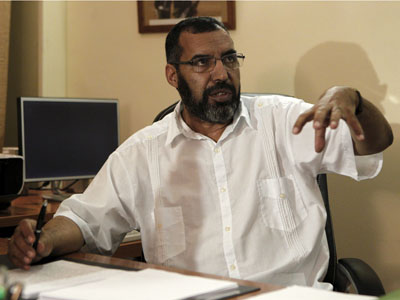'
A village in occupied Western Sahara.
The refugee camps in Tindouf, Algeria shelter an estimated 200,000 Saharawi refugees from the Western Sahara, a country that has been occupied illegally by Morocco since the 1970s.
The Saharawis have been living in the camps for just as long, and so generations have grown up in the isolated society of the camps, a society defined by its exile. The Saharawis share this identity, being refugees as well as being under occupation, with the many other displaced groups, including, perhaps most famously, the Palestinians and the Tibetans.
In its work to ensure the land rights of displaced peoples, the Habitat International Coalition (HIC) has found forming solidarity alliances between different groups under occupation beneficial.
”It’s one of the tactics that actually peaks people’s interest, gets people thinking,” said Joseph Schechla, the coordinator of the HIC’s Housing and Land Rights Network in Cairo, in drawing these parallels.
Naturally, the exiled populations themselves are also aware of their interconnectedness and how this might affect their cause, for better or for worse.
According to Schechla, many peoples under occupation are, contrary to most people in most of the world, aware of the issue of Western Sahara and its many long-term refugees.
”The Tibetans especially, are very aware of it, the Kurds as well, and the Palestinians,” he said.
”The Tibetans in general and the Dalai Lhama in particular, have been quite keen on this connection. But not for the geopolitical reasons – this is about the common experiences peoples have under occupation or in similar situations,” he added.
However the public display of political solidarity is often of a more complex character.
While the Tibetans under Chinese rule might be sympathetic to the Saharawi struggle for self-determination, the Palestinian leadership is not, at least not overtly.
”While some Palestinians may appreciate that there are other groups in the world that are under occupation, living under similar conditions, at the level of Palestinian authorities, this isn’t the case,” Schechla continued.
The Palestinian leadership has so far considered it beneficial to their cause to politically distance itself from the Tibet issue as well as the Western Saharan occupation – despite the fact that the violations under which the countries are suffering can easily be seen as analogous.
”Twice already, the Dalai Lhama has asked for a spiritual visit, so not only political, to Bethlehem. Which the authorities have refused,” Scheclha said.
According to Schechla, this configuration of alliances, or the lack thereof between the countries under siege, can be seen to expose some of the underlying geopolitical contradictions, which exist also within the United Nations.
”China has been a champion of the Palestine cause in the UN,” he says, ”so they expect reciprocity of the official level of solidarity with the Chinese geo-political position.”
Jørn Henriksen, chairman of The Norwegian Support Committee for Western Sahara, agreed with Schechla that comparative analysis of occupied peoples is useful in informing the public.
”In our work, we cooperate with The Palestine Commitee of Norway and they support us reciprocally. There are Palestinians supporting freedom for Western Sahara of course, but especially officials from Palestine support Morocco. I guess it’s because they are afraid to lose the support from Morrocco for their own issue, if they were to touch Western Sahara,” he said.
Henriksen continued that, ”I personally think it’s a strange strategy, as I would imagine that working on issues of international law and the UN and strengthening those institutions (in relation to the rights of occupied peoples) would be bound to help everyone. It shows the power of politics over international law, but the Palestinians have been let down by the UN before, so you can understand why they don’t put all their eggs in that basket. But coming from a solidarity organization, I would find it natural for one occupied people to support another.”
BM

















